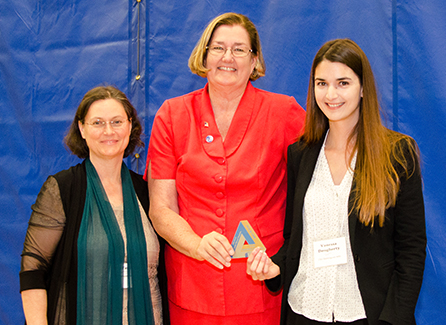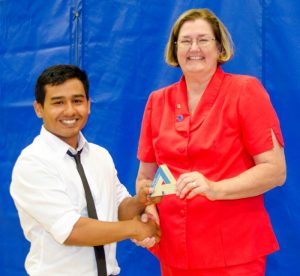
For their ground-breaking research on incorporating a proven, yet emerging, wellness methodology into occupational therapy (OT), California State University, Dominguez Hills (CSUDH) OT students Lisa Faust and Vanessa Dougherty took 1st Place at the statewide 30th Annual CSU Student Research Competition, held this year at CSU Bakersfield.
Dougherty and Faust won in the “Health, Nutrition and Clinical Sciences” category for their presentation “Occupational Therapy Trauma-Informed Practice Using the Community Resiliency Model [CRM]: Narrative and Photo Voice with Veterans.” The overall goal of their research was to explore the benefits of OT professionals’ use of CRM with trauma-exposed populations, specifically military veterans, and to lay “preliminary groundwork” for future research since there has been no OT-CRM research conducted, according to Dougherty.
It was surreal–just such an honor to win because we knew that the quality of work in the competition was high,” said Dougherty, a Costa Mesa resident. “We are the first OT group from Cal State Dominguez Hills to win 1st place at the statewide competition. When I heard that I was completely floored.”
Under the mentorship of Claudia Peyton, associate professor of occupational therapy, Faust and Dougherty interviewed seven military veterans who had previously learned CRM techniques. Developed by Elaine Miller-Karas, executive director of the Trauma Resource Institute, the Community Resiliency Model is a set of simple skills taught to individuals who suffer from such conditions as Post-Traumatic Stress Disorder (PTSD) to help them “self-stabilize” their nervous systems when situations trigger fight-or-flight sensations in their daily lives. However, the CRM skills may also be used by individuals coping with daily stressors, and by “helping professionals” as a self-help method to prevent compassion fatigue, or burn out.
The CRM skills the veterans learned included “tracking,” paying attention to sensations within the body; “grounding,” the relationship between an individual’s body and the present moment; and “help-now,” the use of specific actions to change focus, especially during situations when a person is feeling distressed, agitated or overwhelmed, such as drinking a glass of water, feeling the fabric on a piece of furniture, or thinking about a pet.
To collect the data, the student researchers conducted two interviews with each participant. The results of the research were put into three categories–past, present, and future–and related to the veterans’ learning of CRM skills. The “past” (prior to learning CRM) data analysis showed the participants’ experienced such issues as personality changes, loss of identity, lack of trust of others and low engagement in social situations. However, the “present” and “future” data showed such new traits as hopefulness, a desire to share CRM with others, re-engagement in activities, and a sense of empowerment.
“Veterans affected by trauma often feel ashamed of their symptoms, as if they demonstrate personal or mental ‘weakness,’ but when they understand that symptoms of trauma are the body’s biological response to stress, they’re relieved and can begin to heal,” said Faust. “It’s about the nervous system, it’s the fight-or-flight response, and how we manage it–whether we have coping skills are not. That’s why having techniques to manage these issues really makes a difference for these individuals.”
2nd Place in Physical and Mathematical Sciences

Additionally, physics major Juan Cardenas took 2nd Place in the “Physical and Mathematical Sciences” category for his presentation “Evidence for Λp Elastic Scattering in the CLAS Detector.” His research, which was conducted with the support of John Price, professor and chair of the Physics Department at CSUDH, focused on determining the structure of the proton by looking at its interaction with a lambda particle, a particle related to the proton where one of its up quarks is replaced by the heavier strange quark.
Cardenas believes the statewide competition and similar events teach students the confidence and verbal skills critical to presenting research to not only professionals in related fields, but also the general public.
“Speaking publicly is something I become increasingly more comfortable with each time I present. While at the competition, I realized that if I am to become a researcher, I will be giving talks like this to perhaps hundreds of more times,” he said. “Making sure that you provide clear, concise and understandable information to your audience is a part of being a researcher, and the competition provided me with the opportunity to test my skills and learn from my mistakes.”
Dougherty, Faust and Cardenas were three of 13 students who competed in the statewide competition after winning at CSUDH Student Research Day in February. The other students were:
Behavioral and Social Sciences
Cynthia Perez, child development “Perceptual Differences between Latino/a and Caucasian Children”
Faculty mentor: Megumi Kuwabara, Child Development
Biological and Agricultural Sciences
Sara Hu, “Mechanisms of Parasitism by the Thermophilic Ant, Melophorus Anderseni”
Faculty mentor: Terry McGlynn, Biology
Creative Arts
Soulaey Mauricio, Ana Melissa Sanchez, and Patrick Taylor “Los Angeles Skacore”
Faculty mentor: George Vinovich, Digital Media Arts
Health, Nutrition and Clinical Sciences
Rebecca Prosser, Michelle Savarese, Katrina Scalzi and Daniel Tran “Shared Experiences of Social Support for People Living with HIV/AIDS: A Phenomenology”
Faculty mentor: Claudia Peyton, Occupational Therapy
Humanities and Letters
Cory L. James “2014 Los Angeles/Long Beach Ports Dispute: Use or Abuse of Mediation?”
Faculty mentor: Margaret Manning, Negotiation, Conflict Resolution, and Peacebuilding